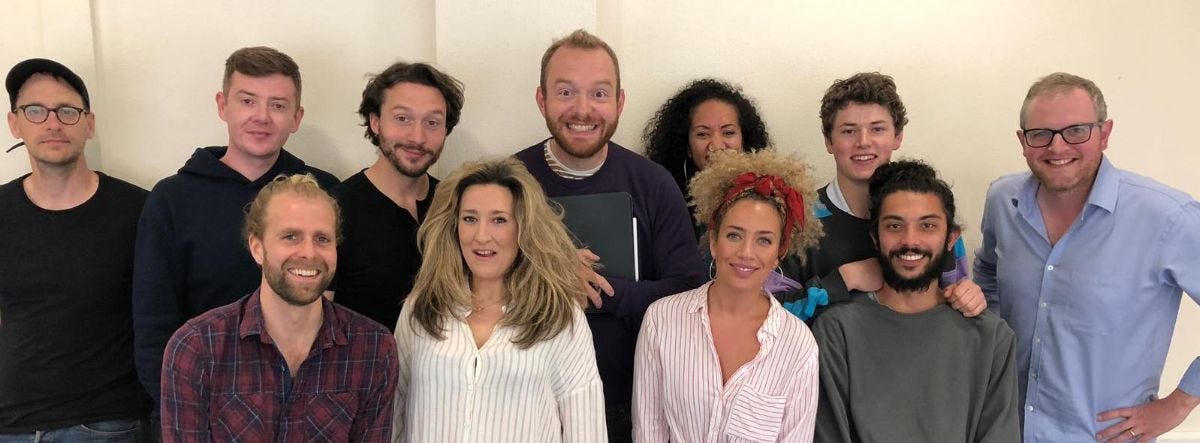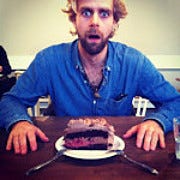What can actors teach us about the good life?

Happy Friday!
3 episodes down, 1 to go!
The popular consensus from the people who were there seems to be that these were the three finest recordings we've ever done. But they say that every year. Hopefully it's true every year nonetheless.
We're now working on the fourth of the four episodes. It feels good not to be stopping. After this is done, we'll put together a pilot for television. It's almost as if this is a real job.
~
Now.
Those of you who follow my thoughts to a frankly intrusive degree, will know of my fondness for Albert Camus.
Not only was he a goalkeeper of some repute (see Monty Python), but as a philosopher he had the flair of a novelist. Or as a novelist he had the flair of a philosopher. I'm not sure which. I've asked Jeeves and he doesn't know either.
In 'The Myth of Sisyphus', Camus lays out the logic of his practical philosophy. The argument (as pertains this newsletter) goes as follows:
There is no god.
So there is no ultimate arbiter of right and wrong, good and bad.
Therefore the old philosophers' hunt for 'the good life' has been a wild goose chase. It's impossible to live a good life because there is no good if there is no bad.
So are there no suggestions a jobbing philosopher can offer on how to live? Yes, there are - Camus proposes. To live not better, but more.
By aiming to get the most out of life we are not dependent on outcomes of subjective good and bad. Camus offers up three avenues for most living.
The actor gets the most out of life by playing hundreds of different roles, sometimes covering the entire span of a life from birth to death in a single day - twice if there's a matinee. This is the archetype of freedom.
The conqueror - whom Camus imagines a kind of soldier - lives constantly in the shadow of death. When you deal in death, life tastes moreish. This the archetype of revolt.
The Don Juan uses romance as the road to most living. Rarely do humans feel more alive than when indulging the fiery emotions of love. This is the archetype of passion.
These are the three archetypes that Camus sketches for us, but it's easy to imagine myriad sub-types - the paramedic and the mountaineer are sub-types of the conqueror, for example.
The Actor
My primary interest here, of course, is the actor. In fact, most of us are actors already - but perhaps we're not getting the most out of the masks we wear. Perhaps we try our hardest to apply the same make-up and costume every day.
There are good reasons why we might want to do that. But if there is no good... What harm can come of trying another role today? It's not forever - the actor melts into another role as easily as night follows day.
So what harm can come of trying another role for ten minutes, in the time it takes you to ride the train two stops?
Expression and Suppression
We seem to have two modes of living (here I deviate from Camus): expression and suppression. I am either expressing something or I am suppressing something.
There are good reasons, again, why I might want to suppress some impulse. And, besides, we can't express everything all at once: that way mania lies. But the basic distinction is there: either I express or I suppress.
But if there is no good or bad, and our only philosophical position is most living, then there is nothing to be lost from expression.
So why then do we suppress? Personally, it comes down to a fear of rejection by other people. Even when there is no one in earshot, I can feel a weighty oppression from social norms.
Rejection challenges are a great way to turn such obstacles into opportunity. An obstacle isn't a roadblock if it's a game.
Games are areas of life around which we draw a boundary of rules. Inside, we play; outside we work. But those boundaries are arbitrary.
There is no reason why - again, given that there is no objective good or bad - that we can't as individuals draw our boundaries in a wide compass around all of life, and play as the actor plays.
Permission
Can I give you an example?
In Foiled, Sabrina is a god-awful hairdresser with a penchant for chucking customers out of her salon. One of her favourite lines is 'No, absolutely no way, come you - out!' I think Camus would have approved: she says exactly what she wants to say.
It's a role, of course. But it's an extraordinary useful role for us in day-to-day life. Sabrina speaks the unspeakable. And she speaks in such heightened language that, with a smile, she helps us say things we could never say.
We put the words into her mouth that we dream of saying to others. And little by little we build our courage until one day some outrage is visited upon me, like I'm served a dodgy cup of tea, and I say those words: 'No, absolutely no way...'
Sometimes we need permission to express ourselves and, in a world with no good or bad, fictional characters give us that permission. Roles like Sabrina are stepping stones that pick a path through our comfort zone.
We can try a new character on for size, change the cut of our clothes, use new language and tone of voice, take on different mannerisms. Take a peek over the other side of the wall. Try out the priest or the predator.
We have a choice. Expression or suppression, action or inaction, attraction or rejection, stasis or growth, sensitive or resistant, yang or yin.
Empathy
Acting begins with empathy. On stage, you know very quickly whether an actor is engaged empathically with the character and with you, the audience.
If all the world's a stage, then we players must find the empathy in our roles and with each other. For empathy is the conduit that connects us and allows the plurality of experience that Camus prescribes.
To two men living the same number of years, the world always provides the same sum of experiences. It is up to us to be conscious of them. Being aware of one’s life, one’s revolt, one’s freedom, and to the maximum, is living, and to the maximum.
If you like this sort of thing, then you'll probably also like my back catalogue of over 500 posts, all found at davidcharles.info.

I've published 5 books, including stories of hitch-hiking from London to Ben Nevis, and cycling 4,110 miles around Britain. Visit my tiny book shop.
The ebooks are Pay What You Want, so you choose the price tag. Can't say fairer than that.
Other events this week: I sat for my first portrait on Tuesday, before spending the evening selling raffle tickets at The Bike Project's comedy fundraiser. If you ever get the chance to see Nish Kumar, take it. A comedian at the top of his game.
Yesterday I spent the afternoon at the Bridge Theatre, watching my first A Midsummer Night's Dream, starring Foiled alumnus Felicity Montagu. It is, without qualification, bloody brilliant. And probably - with its intricate play-within-a-play structure - what inspired today's musings on most living.
As Camus wrote: 'Breaking all the records is first and foremost being faced with the world as often as possible.' So let's get out and break all records!
Much love, - dc

CREDITS
David Charles wrote this newsletter. David is co-writer of BBC Radio sitcom Foiled, and also writes for The Bike Project, Forests News, Elevate and Thighs of Steel. Reply to this email, or read more at davidcharles.info.


